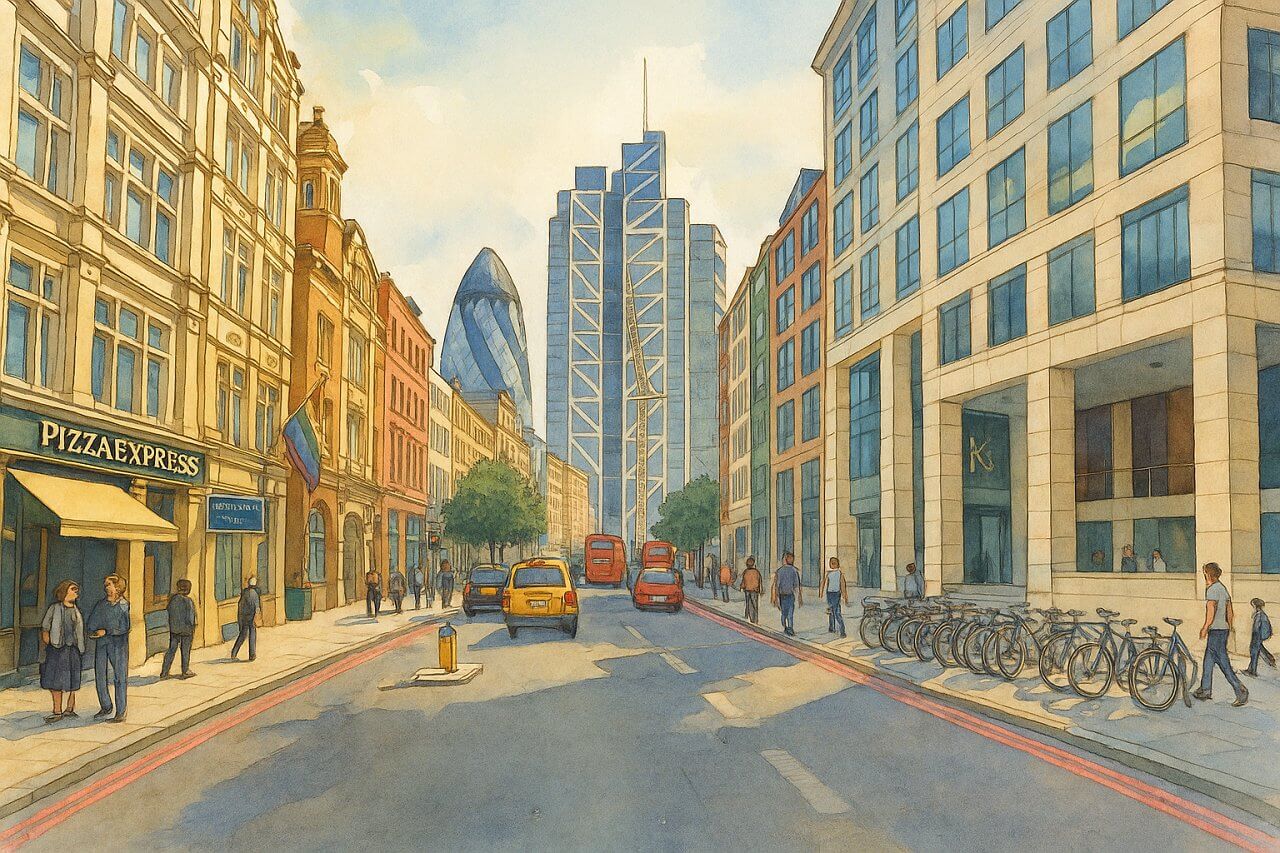
Bishopsgate, London
Connecting Gracechurch Street to Norton Folgate, Bishopsgate is a historic and bustling artery through the heart of London's financial district.
Bishopsgate is located in the eastern part of the City of London, running north from the junction with Gracechurch Street and Leadenhall Street to Norton Folgate, which marks the transition into the London Borough of Tower Hamlets.
This important thoroughfare lies entirely within the historic square mile of the City, a short walk from Liverpool Street Station. It forms part of the A10, a major route extending north out of London toward Cambridge and King's Lynn.
How Long is Bishopsgate?
Bishopsgate measures approximately 0.5 miles (around 0.8 km) in length. Despite its relatively short span, it encompasses a dense stretch of commercial, corporate, and historical significance.
The History of Bishopsgate
The street derives its name from one of the original gates in the London Wall—the Bishop’s Gate. This Roman and medieval structure once guarded the entrance to the City along Ermine Street, the Roman road that led to York and Lincoln. The gate was historically controlled by the Bishop of London, hence the name.
The Bishopsgate itself was first mentioned in records as early as the 12th century. The gate was demolished in 1760 as part of a wider effort to improve traffic flow into the rapidly expanding city.
By the 19th century, Bishopsgate had evolved into a central axis of Victorian commerce and finance, lined with shops, coaching inns, and warehouses. In modern times, its identity is firmly entwined with the financial services industry and major infrastructure such as Liverpool Street Station.
How Bishopsgate Got Its Name
The name “Bishopsgate” comes from the Bishop’s Gate in the old London Wall. This gate was traditionally maintained by the Bishop of London, whose jurisdiction over the route into the City gave rise to the name.
The naming convention was established by at least the 12th century, and like several other City streets named after former gates—such as Aldgate and Ludgate—Bishopsgate retains a name that recalls London's fortified medieval past.
Character and Atmosphere
Bishopsgate is a busy, fast-paced road characterised by a mix of modern glass skyscrapers, historic buildings, and a consistent buzz of foot and vehicular traffic.
By day, it’s dominated by professionals working in the offices of international banks, law firms, and trading companies. The street also features numerous eateries, cafes, and convenience shops catering to the office crowd.
In contrast, during the evening and weekends, the area quiets down somewhat, although nearby Shoreditch’s nightlife keeps the northern end vibrant. Architecturally, the area is a mix of restored 19th-century commercial buildings and striking modern towers like the Heron Tower (110 Bishopsgate).
Property Prices and Real Estate
As of May 2025, real estate along and around Bishopsgate is among the most expensive in London, reflecting its City of London location and corporate appeal.
Office space here can cost between £80 and £120 per sq ft per annum (£861–£1,292 per sq m), depending on the building’s amenities and grade.
Residential property is rare but in high demand. The few flats available in developments like Principal Tower or close to Liverpool Street average around £1,400 to £2,000 per sq ft (£15,070–£21,528 per sq m), significantly above London’s average of approximately £780 per sq ft (£8,395 per sq m) as of early 2025.
Nearby Underground Stations and Transport Links
Bishopsgate is extremely well connected by public transport:
- Liverpool Street Station (Central, Circle, Hammersmith & City, Metropolitan lines and National Rail)
- Aldgate Station (Circle and Metropolitan lines)
- Aldgate East (District and Hammersmith & City lines)
- Shoreditch High Street Overground Station is a short walk to the north.
Liverpool Street also connects to the Elizabeth Line, offering rapid connections to the West End, Heathrow, and beyond.
Fun Fact
Bishopsgate is home to the Heron Tower—officially known as 110 Bishopsgate—which features one of London’s highest rooftop bars, the famous Duck & Waffle. Located on the 40th floor, the restaurant is open 24/7 and offers panoramic views across the city skyline, making it a favourite for both Londoners and visitors.
Another quirky fact: on this very road stood the now-vanished Bishopsgate Institute (founded 1895), a rare Victorian public institution that still holds thousands of rare books, pamphlets, and materials documenting London’s social history.
Quick Facts
- Location: City of London, from Gracechurch Street to Norton Folgate
- Length: Approx. 0.5 miles (0.8 km)
- Name origin: From the medieval Bishop’s Gate in the London Wall, controlled by the Bishop of London
- Character: High-paced financial and corporate environment, with modern towers and historic architecture
- Residential Prices (May 2025): £1,400–£2,000 per sq ft (£15,070–£21,528 per sq m)
- Nearest Tube Stations: Liverpool Street (Central, Circle, H&C, Met, Elizabeth Line), Aldgate, Aldgate East
- Fun Fact: Home to the Duck & Waffle—London’s 24-hour restaurant in Heron Tower
Map of Bishopsgate, London

Painting of Bishopsgate, London (View image in full size)